#2021 hugo awards
Text
Lesbians in Space: The Anthology (Where No Man Has Gone Before)
Booktopia 2024 📚#Fantasy#Indie#Sci-Fi
Following Project
Share

You've asked for it, so Space Wizard provides. Here is the long-anticipated Lesbians In Space Anthology!
Space Wizard Science Fantasy!
Space Wizard Science Fantasy is a queer science fiction and fantasy indie publishing company which opened its doors in 2021 to publishing outside authors.
- In 2022, the Space Wizard Science Fantasy Year 1 campaign raised nearly $18,000 to pay authors top rates, create amazing book covers, fund an audiobook recording, and publish 12 books between June 2022 and June 2023.
- In 2023, Year 2 raised over $18,000 for 12 more books released from June 2023 to June 2024 with more excellent covers, custom illustrations, and pro rates for our anthology writers! This year we added exclusive collector's hardbacks!
- In 2024, Year 3 just concluded in July with another $17,250 raised for for 13 books, one omnibus, and 2 TTRPGs!
We're back again this September for one more anthology, this time with a bunch of incredible authors participating in Booktopia. Lesbians in Space has a stellar (ha!) lineup of writers already on board, including (in order of confirmation):
- Seanan McGuire, multiple Hugo Award-winning author of the Wayward Children series, the October Daye series, and the Incryptid series!
- Travis Baldree, author of Legends and Lattes, shortlisted for the Hugo Award for best novel in 2023, as well as exceptional audiobook narrator!
- Emma Newman, Hugo Award-winning podcaster and author of the Planetfall series, which was shortlisted for the Best Series Hugo Award in 2020!
- Mary Robinette Kowal. Hugo Award-winner Mary Robinette Kowal has written: The Spare Man, The Glamourist Histories series, Ghost Talkers, the Lady Astronaut Universe, and many short stories.
Also see our "writers" section below for our current roster, and for how you can submit your story!
Lesbians in Space: Where No Man Has Gone Before
Peanut butter and chocolate. Cheese and wine. Sex and rock n’ roll. History is full of great pairings.
Get ready for the next great one: Lesbians and Space! Join a host of intrepid explorers heading to the outer reaches of the galaxy, exploring planets, space stations, strange new worlds and interesting aliens. Focusing on lesbian / sapphic protagonists, this anthology will contain works from numerous established, award-winning, and lesfic authors, and a few new faces as well.

We have an amazing cover already created by Serene Chia, and we have a bunch of great addons and gifts for you as well! This anthology is going to be packed with fully-inclusive, sapphic stories about space, space opera, science fiction, exploration, adventure, and of course, romance. The stories will have representation of all sorts, including cis, trans, bi, sapphic, non-binary, ace, aro, and many other types. There's lots of room for Lesbians in Space!
We have our invited group of writers already working on stories for the anthology, but we're opening up to any and all submissions as well! So if you're a writer, polish off your best story about Lesbians in Space, and send it in!
Are you a writer? Do you like Lesbians in Space? We will be holding juried selections for more stories for the Lesbians in Space anthology.
To enter, simply polish off your writing skills and craft a story of around 2000-4500 words, but definitely not over 6000.
This anthology will focus on lesbian relationships of all types, including cis, bi/pan, ace, non-binary, intersex, trans, and others that fall under the ‘sapphic’ banner as long as the primary pairing is lesbian. Give us your best story featuring sapphic protagonists at least partially located in space. This could be on a spaceship, with magic, on a planet or asteroid, in another dimension or realm, or any other connected idea. Surprise us!
Stories will be juried and final selections will be made (hopefully) by end of January 2025. Projected publish date is June 2025. Selected authors will be compensated at semi-pro rates or higher. Send your completed story in by midnight EST, December 31st, 2024 using the instructions at https://www.spacewizardsciencefantasy.com/submissions
We are hoping to publish Lesbians in Space around June 2025.
-- I've just backed this as it looks absolutely fabulous!
30 notes
·
View notes
Text
Прекрасные и мрачные работы Ровины Кай.
Beautiful and dark works by Rovina Kai.
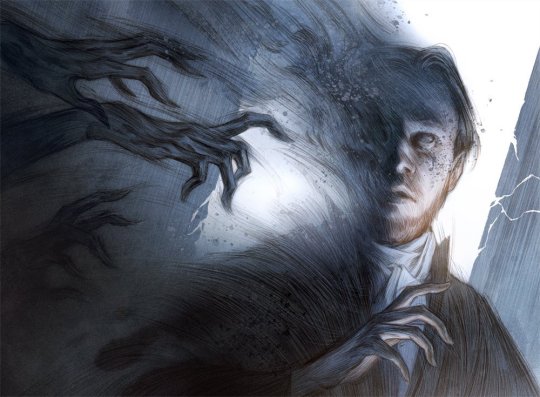

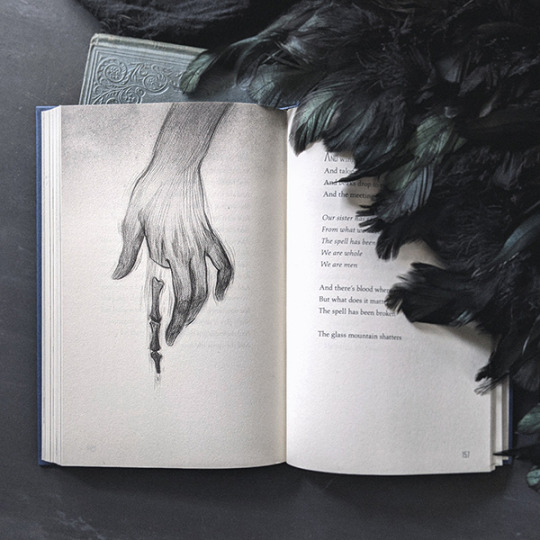
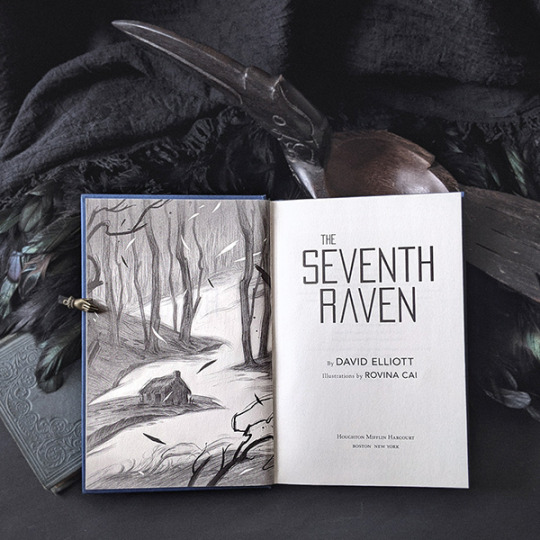
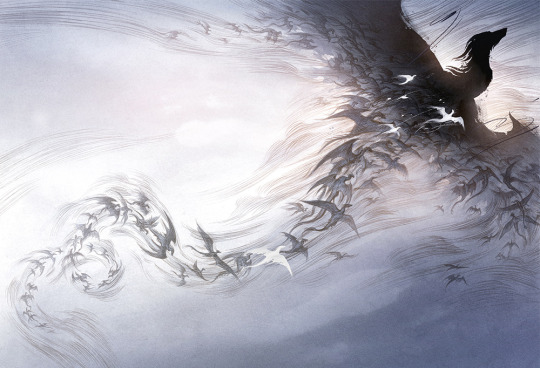
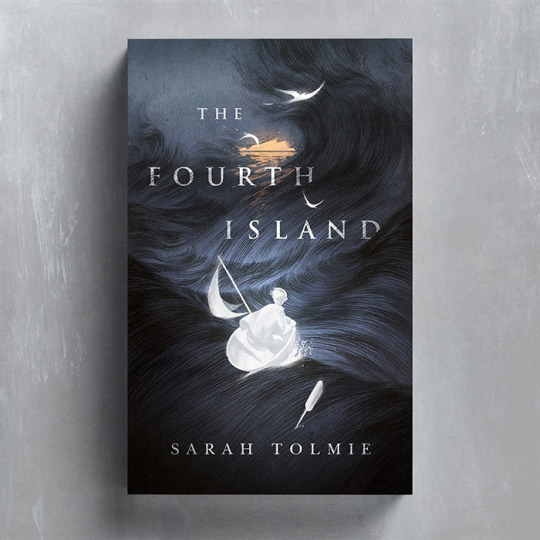
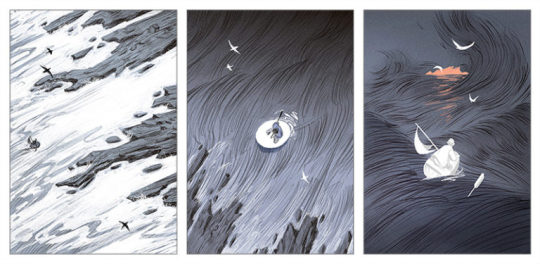
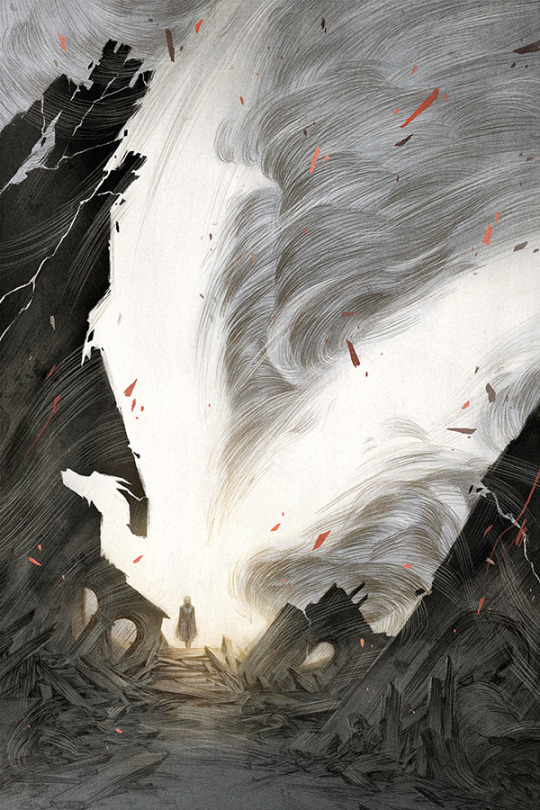
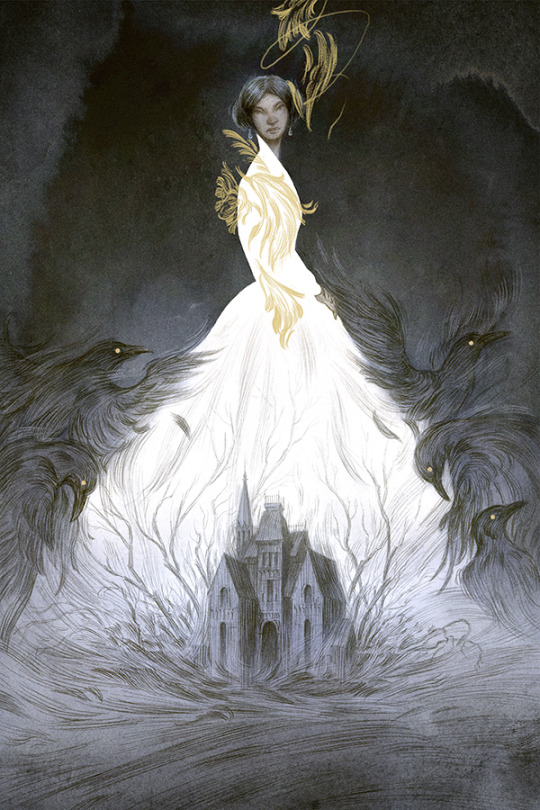
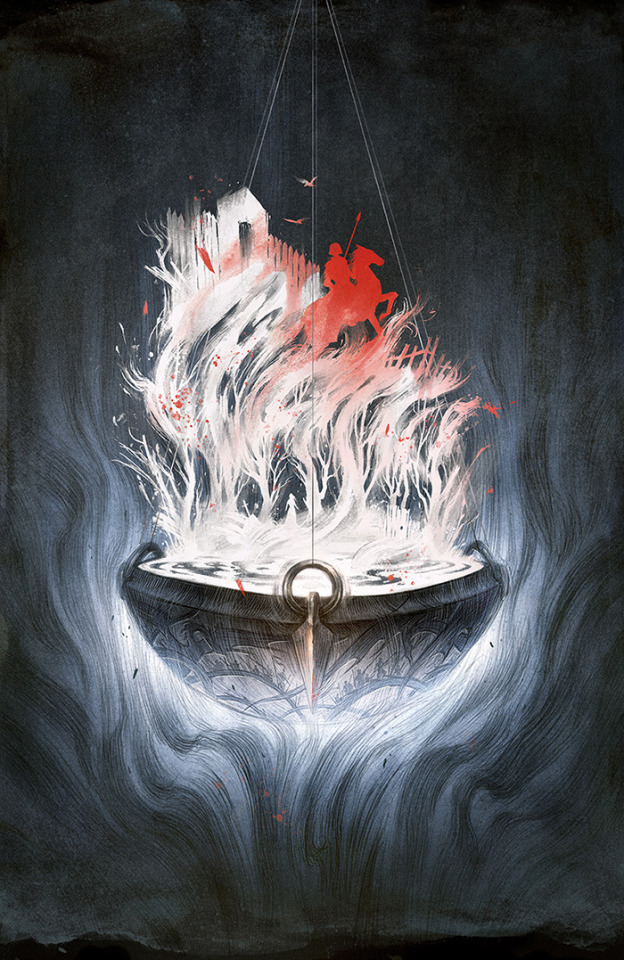
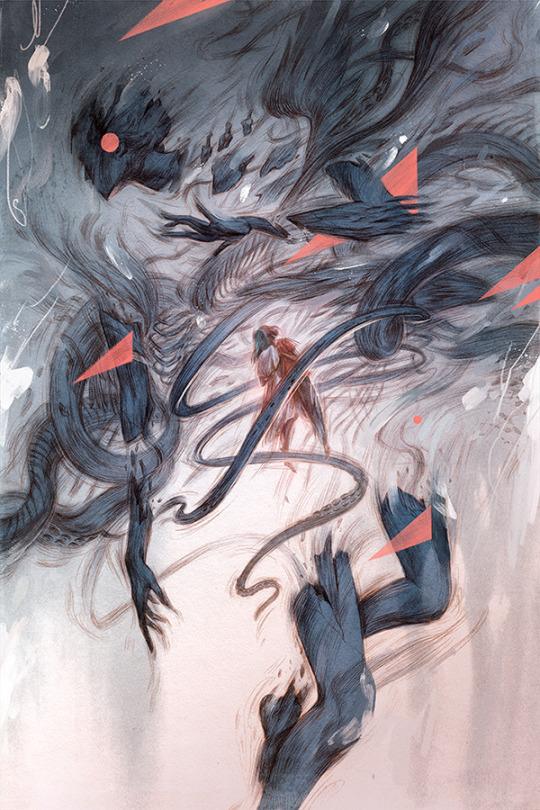
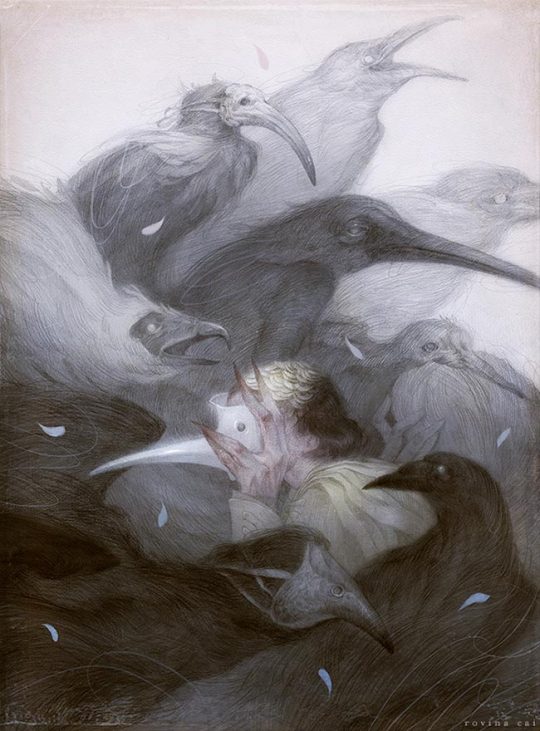
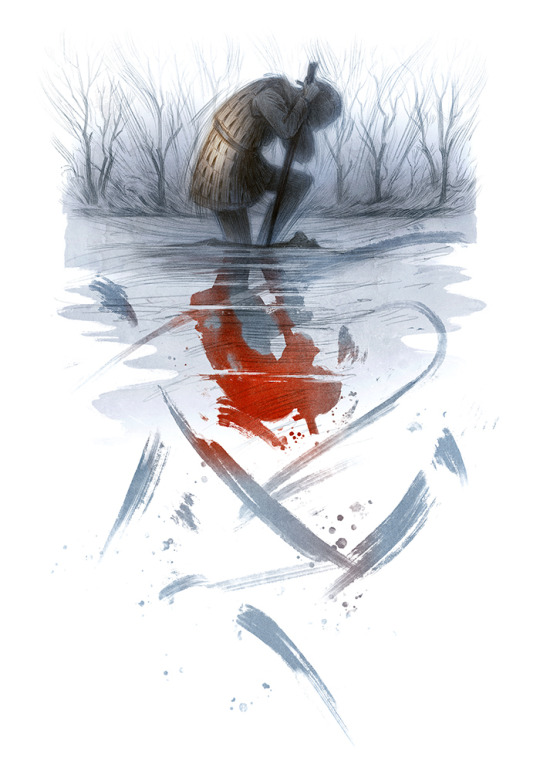
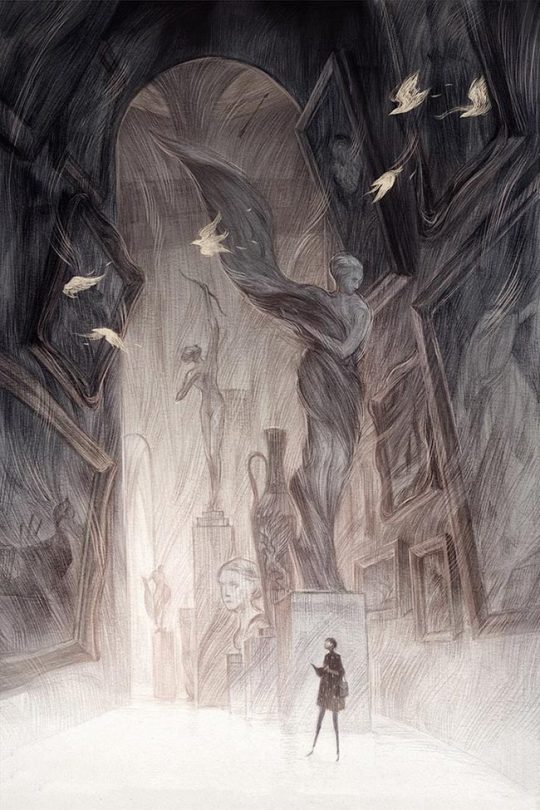
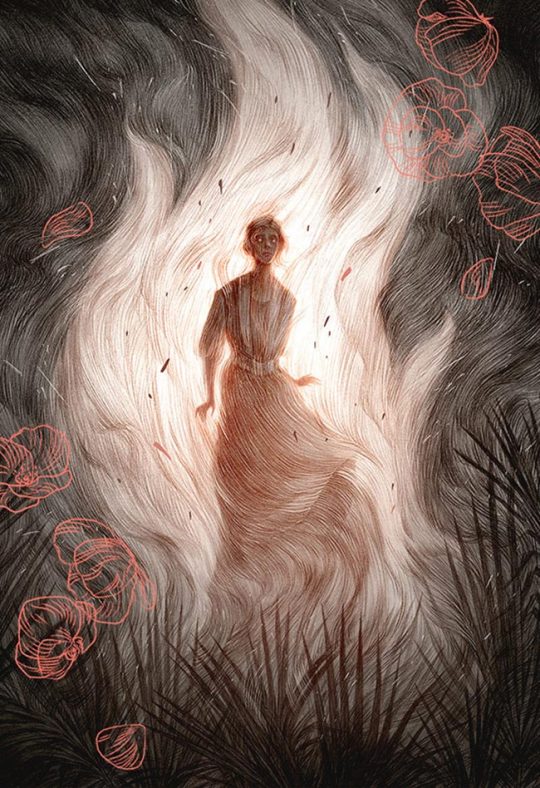
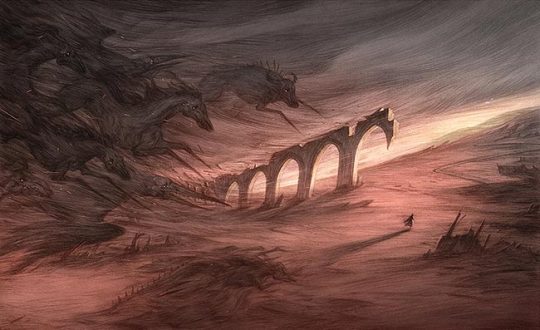
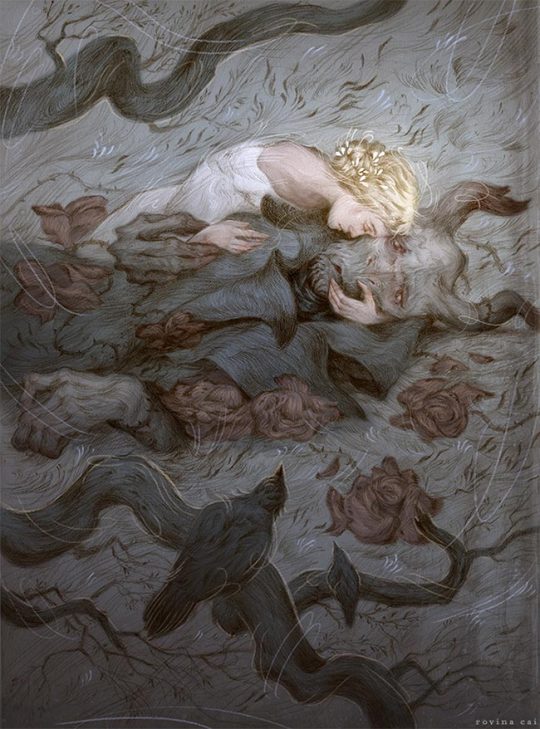
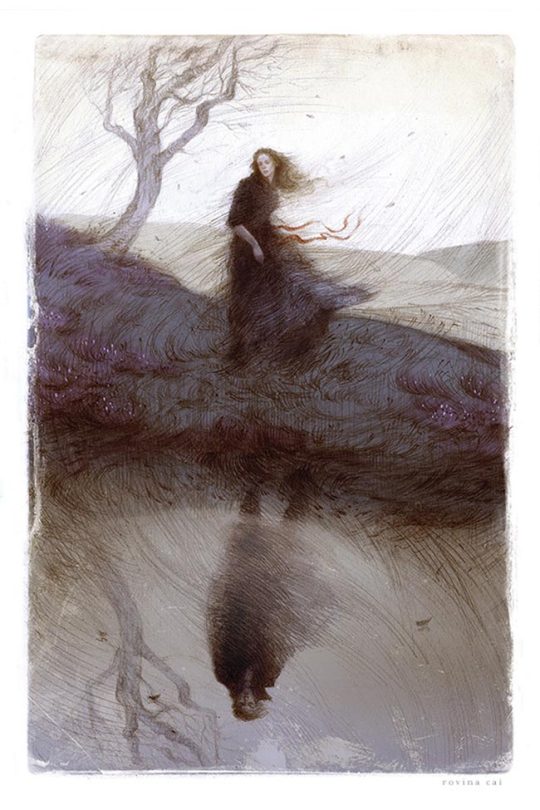
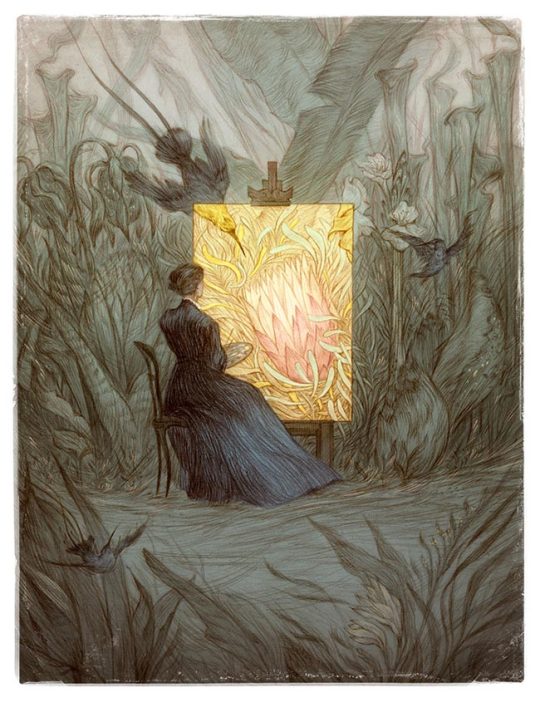
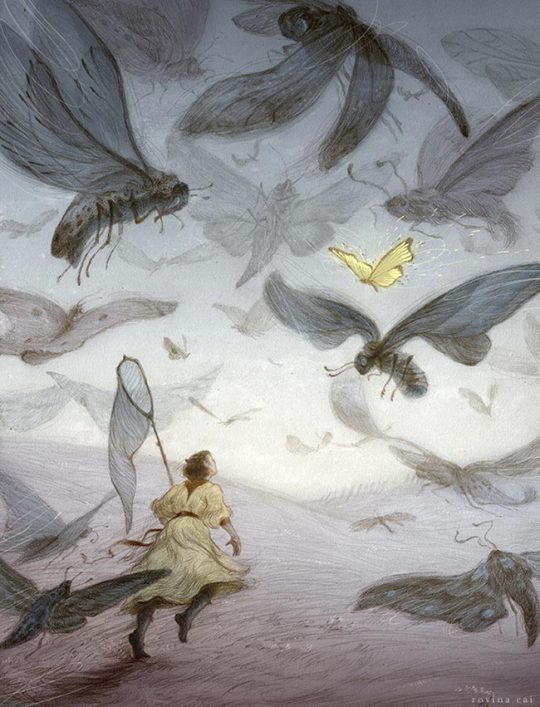
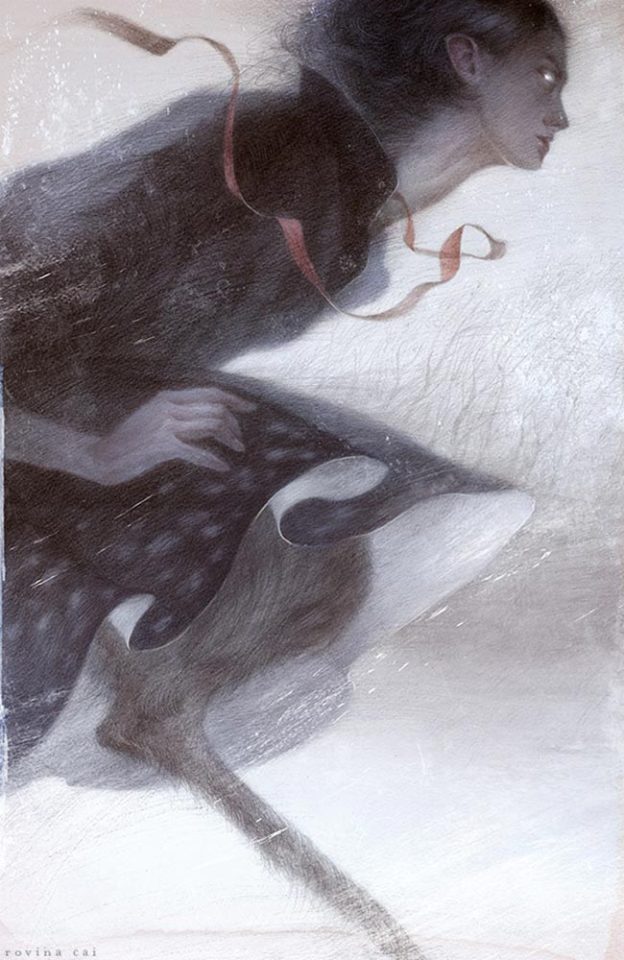
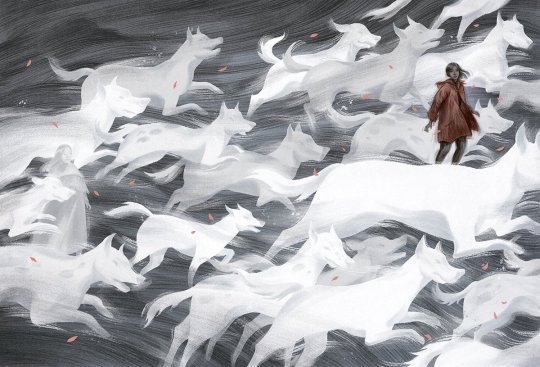
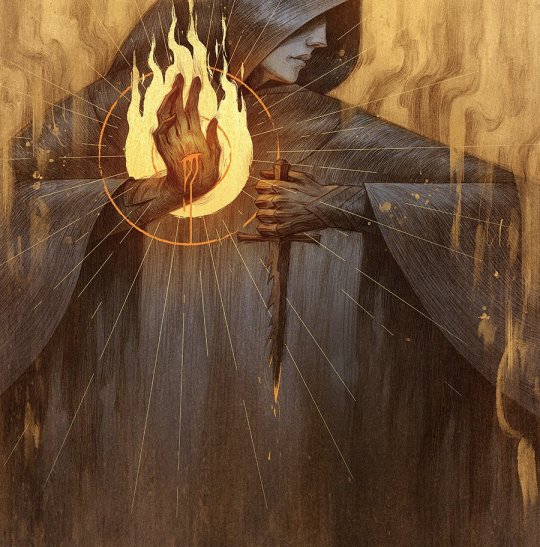
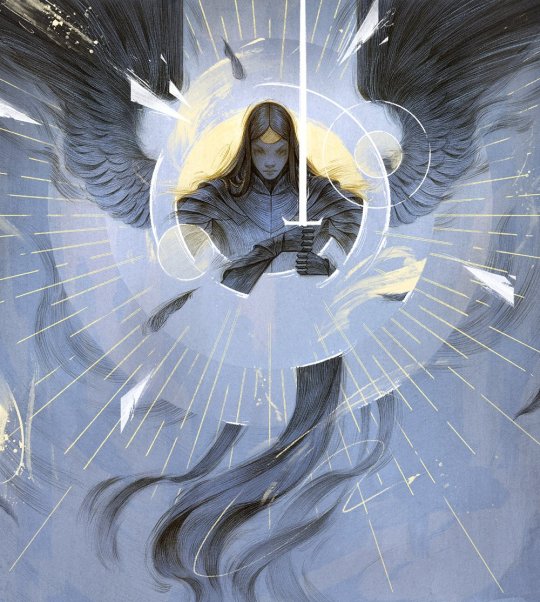
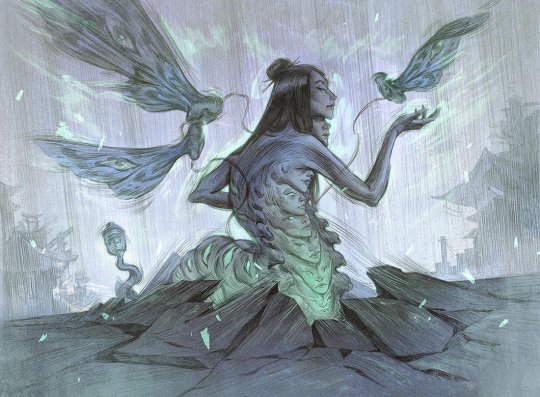
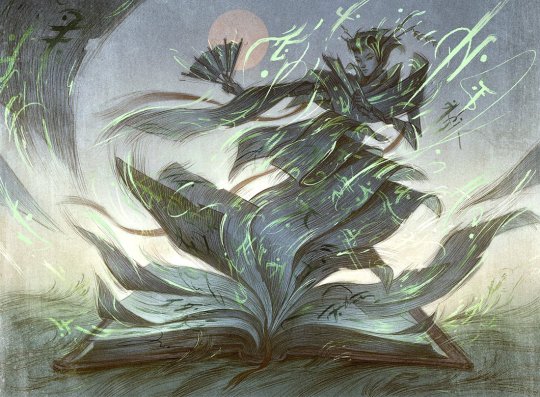
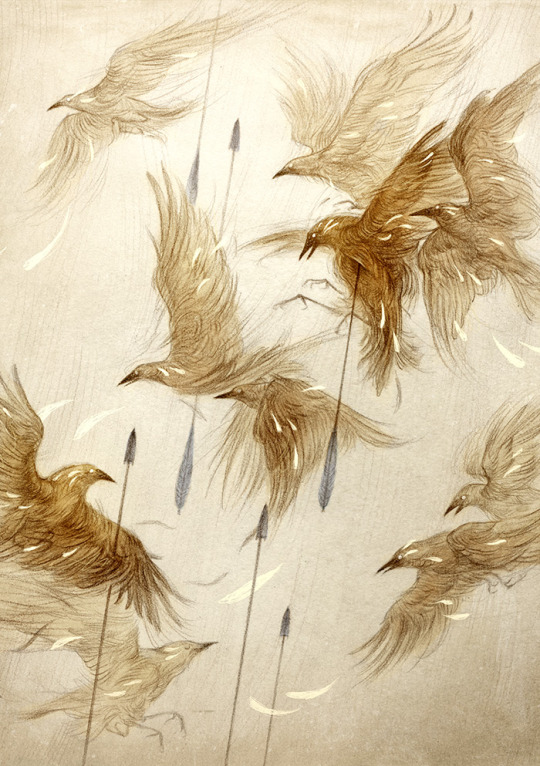
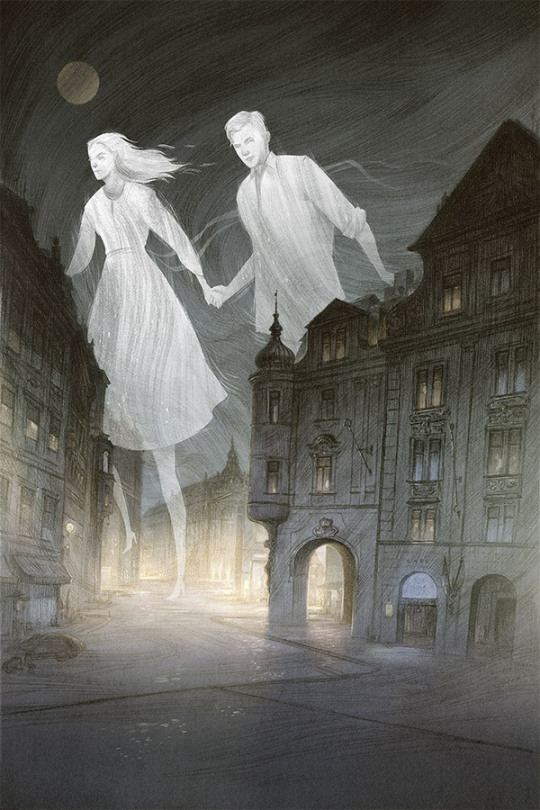
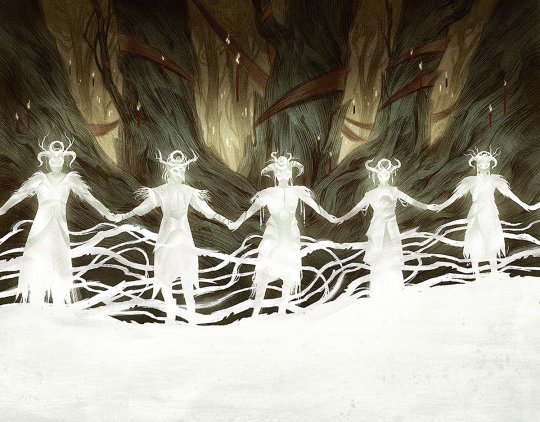
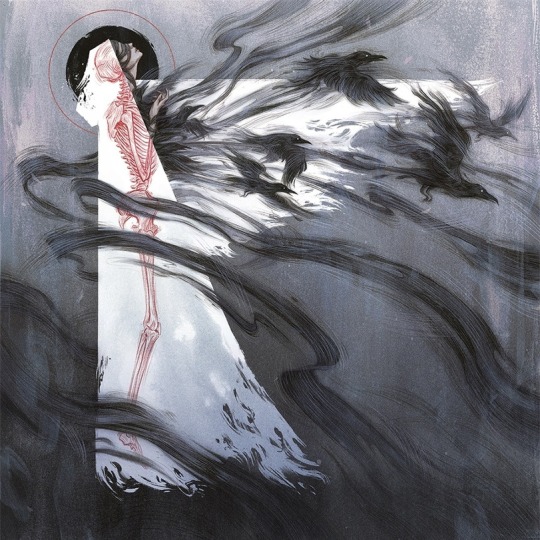
Ровина Кай (Цай) (Rovina Cai) — австралийская художница, иллюстратор.
Награды и премии:
-Всемирная премия фэнтези / World Fantasy Award, 2019 // Художник;
-Хьюго / Hugo Award, 2021 // Профессиональный художник;
-Всемирная премия фэнтези / World Fantasy Award, 2021 // Художник;
-Хьюго / Hugo Award, 2022 // Профессиональный художник.
Вот что Ровина рассказывает о себе:"
Меня зовут Ровина Кай, я люблю иллюстрировать истории из мифологии и сказок, смешивать мрачные образы с красивыми. Большую часть работ я создаю в жанре фэнтези/научной-фантастики. Прежде чем стать иллюстратором, я изучала графический дизайн, и до сих пор люблю барахтаться в богемных вещах.
Но когда я закончила учиться, я не обнаружила сообществ иллюстраторов или каких-нибудь курсов в Австралии, поэтому я пошла на факультет графического дизайна. Только перед окончанием университета, я попала на конференцию по дизайну и услышала, как пара иллюстраторов разговаривают о своей работе, меня это очень вдохновило и я решила добиться своей мечты, насколько бы трудной она не была. Я поняла, что иллюстрация — это то, чем я действительно хочу заниматься."
Rovina Cai is an Australian artist and illustrator.
Awards and prizes: -World Fantasy Award, 2019 // Artist;
-Hugo Award, 2021 // Professional Artist;
-World Fantasy Award, 2021 // Artist;
-Hugo Award, 2022 // Professional artist.
Here's what Rovina says about herself:
" My name is Rovina Kai, I love to illustrate stories from mythology and fairy tales, mixing dark images with beautiful ones. Most of my work is in the fantasy/sci-fi genre. I studied graphic design before becoming an illustrator, and I still love dabbling in bohemian things.
But when I finished studying, I didn't find any illustrator communities or courses in Australia, so I went to graphic design. Just before graduating from university, I went to a design conference and heard a couple of illustrators talking about their work, I was very inspired and decided to achieve my dream, no matter how difficult it was. I realized that illustration is what I really want to do."
Источник://cgmag.net/intervyu-s-rovina-cai, /fantlab.ru/art17594, /www.muddycolors.com/2018/09/rovina-cai-on-style/, //beautifulbizarre.net/2017/09/18/alluring-fantasy-worlds-rovina-cai/,
//www.rovinacai.com/portfolio/the-seventh-raven-interior-illustrations/,
//characterdesignreferences.com/artist-of-the-week-5/rovina-cai.
#живопись#картины#искусство#художник#иллюстратор#Ровина Кай#книги#птицы арт#животные арт#люди и монстры#фантастические миры#фэнтези арт#art#painting#artist#illustrator#Rovina Cai#books#animals art#birds art#people and monsters#dark art#fantasy illustration#fantasy art
75 notes
·
View notes
Text
in less than 60 days, It will have been a year since blaseball was suddenly canceled.
TRUST ME, THE OTHER TAGS WILL MAKE SENSE IN A LITTLE WHILE.
Blaseball, in its 2.867 Years of existence, was many things. but the easiest way to describe it is "Good". It had a very incredible fanbase that still kind of mourns the game to this day. the devs had a panel at GDC in 2022. It was nominated for a Nebula Award for Best Game Writing in 2021 and also the "Best Video Game" at The Hugo Awards in 2021. It won the Nuovo Award at the independent games festival in 2021.
people could observe the games happening, gamble fake money, and also affect how the story and the characters would develop at certain points.
It was a great game, that sadly was canceled because the cost that was needed to run the game was too high for the team at the game band to support, at least according to wikipedia.
It being dead is also a major part in proving that there is no justice in the universe because of it not being here, yet SILENT HILL ASCENSION SOMEHOW HASN'T KICKED THE BUCKET YET.
Now for all Silent Hill fans who have blocked that game out of their memory, and for everyone who has no idea what Silent Hill Ascension IS, here is a refresher:
"Released" on October 31st, 2023 (which was already a bad day for me, but I am NOT getting into that), Silent Hill Ascension is an interactive thing (listen its not a tv show, and it isnt a video game. the developers say that its "the best of both", but lets be honest its more of the WORST of both) that is canon to the silent hill franchise.
people can observe the games happening, gamble fake money, and also affect how the story and the characters would develop at certain points.
Yes, I know this sounds EXACTLY the same as what I described blaseball as, but thats because I purposefully oversimplified both games a bit.
Silent Hill Ascencion has bland writing (so bland people even thought it was AI), all the mechanical depth of a bad mobile game, and all the horrible microtransactions (loot boxes, a season pass, and something else I will get into later) as well.
Blaseball, as previously mentioned, was nominated for several story writing awards, had enough mechanical depth that some fans created a SCIENTIFIC COLLECTIVE TO ANALYZE IT, and at the time it died, NEVER had any micro transactions or a fee to enter.
Remember how both games use fake money?
In Blaseball, those who were in the 1% of money havers had all their coins distributed to the other players.
In Silent Hill Ascension, you can literally just buy so many "Influence Points" that you can manipulate the entire fucking story, and you can hoard them for as long as you fucking want.
Also, Something else I want to mention: Literally nobody talks about Silent Hill Ascension because its so bad. hell, and those that do talk about it DON'T have anything good to say. very few people play it, and there are a shit ton of bots that the devs added so it feels like more people are actually watching.
Silent Hill Ascension has reached lower lows than blaseball ever did, and is less than half a year old.
So why the hell is it still alive, when a game that did its entire stick better is fucking dead.
THE ONLY REASON I CAN THINK OF FOR IT BEING ALIVE IS BECAUSE ITS SUPPORTED BY FUCKING KONAMI.
There is no justice in the world.
19 notes
·
View notes
Text
Summary of Hao Jingfang's involvement in the WOH fandom:
Who is Hao Jingfang? Hao Jingfang 郝景芳 is a Science Fiction writer who won the Hugo Award for her novelette Folding Beijing back in 2016.
May 6, 2021 (two days after the WOH concert)—Hao Jingfang posted a review of WOH. She claimed the show helped her get rid of her writer's block and inspired her to continue working on her new book. She said she liked Gong Jun and Zhang Zhehan and wanted them to star as the main leads of the film adaptation of said book. She said that she planned to have Word of Honor's scriptwriter, Xiao Chu, adapt the novel for screenplay.
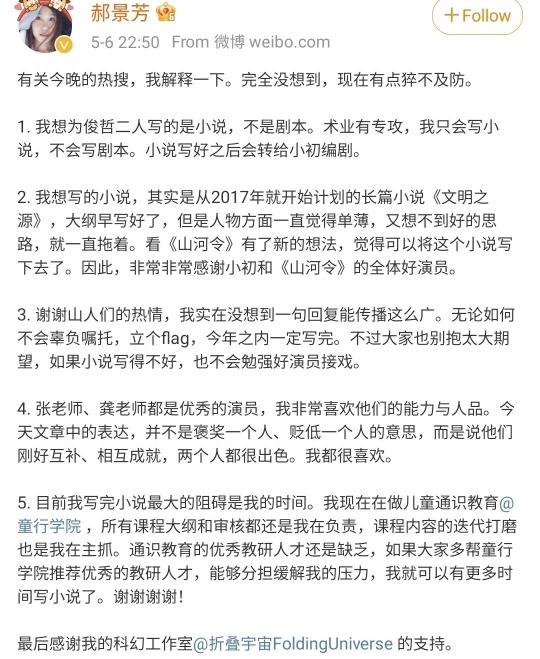
Hao Jingfang soon started publishing chapters of the novel—titled 宇宙跃迁者 (Cosmic Jumper)—online. And everytime she would put Junzhe/LLD references on her blurbs. A huge chunk of Junzhe fans expressed support for this project.
When 813 happened, Hao Jingfang condemned Zhang Zhehan on the blurb of a newly posted chapter (without explicity naming him, but it was very obvious who she was talking about)

She said that since she was writing a story about "heroic Chinese people leading the world" it was very important to her that the actors starring in the adaptation have clean reputations. In the last line, she implies that ZZH's moral character and patriotism is lacking. She deleted it a few hours later.
A few days later, she posted a new chapter and the blurb contains more Junzhe references. Junzhe fans called her out for still using the references after she had already condemned ZZH. She deleted it and never used Junzhe references on her blurbs after this again.
The fandom stopped paying attention to her and supporting her work after 813 and she slowly disappeared from the fandom's radar. She appeared again sometime in December when Li Xuezheng was active and talking about ZZH's case. She made a post that can be read as veiled support for ZZH.
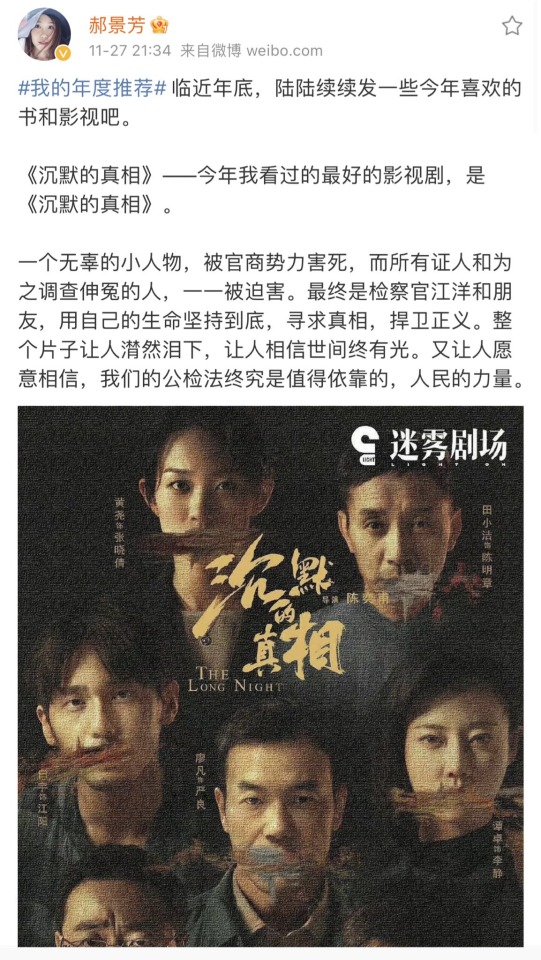
Months later at around May 2022, Hao Jingfang once again appeared in the fandom when her main weibo account was muted. She then accused GJ on her side account of being the one behind the muting of her main account. Did she provide a shred of evidence? No.
It's worth noting that prior to the muting Hao Jingfang wrote and posted an essay talking about the war in Ukraine and the COVID situation in China. These topics (especially at the time) were considered to be highly sensitive and controversial. Her being a public figure talking about these topics on weibo is the most likely reason she was muted, especially since it was clearly stated that she was muted for violating laws and regulations, and not just for community guidelines.

Fans then found out that Hao Jingfang is actually friends with the Word of Honor scriptwriter Xiao Chu and a man by the name of Zhang Peichao.
Who is Zhang Peichao? Zhang Peichao, also known as Patrick Zhang and "Doc Creepy", is a psychoanalyst based in Shenzhen who follows the teachings of Freud, believes in stuff like the Oedipus complex, asserts that homosexuality is a response to childhood trauma, encourages gay conversion therapy, etc etc. He first appeared in the fandom when WOH was still airing and published a few essays about the show. One gimmick of his is psychoanalysing the characters according to his sick and perverted views, like saying that Wen Kexing's sexuality is due to Oedipus Complex. Zhang Peichao also seems to be obsessed with the actors themselves, particularly with ZZH and the character he plays in WOH, Zhou Zishu.
TLDR; he is a creepy perverted slimeball hence the nickname "Doc Creepy"

But the reason Hao Jingfang's connection with Zhang Peichao is interesting is because he's suspected by the fandom to be the heart and soul of the Zhang Sanjian scam. And the big accounts that heavily promote Zhang Sanjian have also expressed their support for Hao Jingfang's unfounded accusations against Gong Jun.
Since she attempted (and failed) to start a smear campaign against Gong Jun, we haven't really heard from Hao Jingfang after that. The rest of the updates on this situation are from unverified sources (eg. released chatlogs) so I won't include them.
P.S. I've read about half of her novel 宇宙跃迁者 and it sucks. Don't bother wasting your time and money on it. If she's "at the forefront of Chinese sci-fi" then Chinese sci-fi is fucking doomed. There are much better sci fi works on jjwxc.
42 notes
·
View notes
Note
Everyone I know who found TIHYLTTW mildly disappointing and overhyped (including me) read it shortly after it came out and won all those awards. I'm not sure where people got the idea that everyone is suddenly discovering it thanks to that Trigun fan's tweet going viral (which was neat in itself). Anyway, the mixed opinions of this book among core SFF readers starting in 2019 are part of an ongoing conversation about what gets praised in the Hugo-winning mainstream (non-Puppy, non-dudebro space), which is often cliquey, risk-averse, and arguably compromised in terms of the core ethics/values of progressive SFF. For instance, the Hugo Awards got a ton of backlash in 2021 for being sponsored by the American defense giant Raytheon. This was the same year that you had winners like the fifth instalment of Murderbot Diaries, which has been recced on your blog as good ace rep (I only half-agree as it falls into the robot-as-ace stereotype, but that's beside the point; for a certain kind of reader, "good rep" is the only real litmus test of a book's quality and so they praise it even when it's iffy). Basically you have a situation where an org devoted to progressive, inclusive SFF takes blood money while feeling minority-allied and conflict-free. And while none of this implicates TIHYLTTW directly or any other Hugo-winning book from any adjacent year, I can't help but feel like the excessive (imo) praise of certain books exists against the background of larger decoupling of personal ethics/politics and inclusive rep in fiction. And what inclusive queer rep looks like in a space where you're discouraged from taking risks and getting nasty is shallow characterization, bloodless insta-love, and stylish prose that keeps you at arm's length.
--
17 notes
·
View notes
Text
Robin Hobb
Fantasy writer Megan Lindholm, known to her readers as Robin Hobb, was born in 1952 in Berkeley, California. Hobb is best known for her books set in The Realm of the Elderlings, to which readers were first introduced with the publication of The Assassin's Apprentice in 1995. She has written multiple critically acclaimed series, including The Rain Wilds Chronicles and the Liveship Traders Trilogy. Hobb's writing has been translated into more than 20 languages. She has been a finalist for the Nebula and Hugo Awards, and in 2021, she received the World Fantasy Award for Life Achievement.
5 notes
·
View notes
Text
Recommended Reading
Here is a list of books, both prose and graphic, that I think are worth checking out. All of these books are speculative fiction (science fiction, fantasy, alternate reality, et cetera), since that’s essentially the only genre I read. Entries followed by a ♥ are my extra-special favorites. The ones marked with an H won at least one Hugo Award. Those marked with a Q contain prominent LGBTQ+ characters or issues.
Lighter Science Fiction
Douglas Adams: The Hitchhicker's Guide to the Galaxy and its first two sequels, The Restaurant at the End of the Universe, and Life, the Universe and Everything. The Hitchhiker’s Guide is a landmark work in SF comedy and is a must-read. If you are an audio listener, then I suggest starting with the 1978 BBC radio play, which was the original version of this story. (If you like THHGTTG, then check out Dirk Gently’s Holistic Detective Agency and its sequel.) ♥
John Scalzi: Any of his SF, especially the Old Man's War series and the Interdependency series (The Collapsing Empire and its sequels). Scalzi’s work, with few exceptions, is not only very funny, but also includes some good science-fiction-y “big ideas.” If you are a fan of Star Trek, then his novel Redshirts, which won a Hugo, will be of particular interest. Interestingly in some of Scalzi’s recent work, such as Kaiju Preservation Society and the Lock In series, he never revels the gender of the main character. Almost all of Scalzi’s audiobooks are read by Wil Wheaton. Wheaton does a great job, but his voice does tend to make the listener imagine the main character as a man, even when there’s no textual evidence to support that imagining. ♥H
Martha Wells: The Murderbot Diaries (All Systems Red and sequels), winner of the 2021 Hugo Award for best series. Despite the name, this series of five novellas and one novel follows a human-bot hybrid (not a robot) security unit (SecUnit) as it struggles to protect its stupid humans while coping with social anxiety and finding time to watch soap operas. Plus, it doesn’t really murder all that often. The series is very funny, but it is also a surprisingly serious and insightful examination of sentience, autonomy, and living with neuroses. Wells, who identifies as neurodivergent, will write three more Muderbot books, beginning in November 2023, as part of her six-volume deal with Tor. I particularly enjoy Kevin R. Free’s narration of the audiobooks. I’m counting these books for LGBTQ+ representation because Murderbot is nonbinary and asexual, but since it isn’t human (and doesn’t want to be), nonbinary and/or ace readers (whom I assume to be human) may not find themselves reflected in Murderbot’s experience. ♥HQ
Scott Meyer: The Authorities series (The Authorities and Destructive Reasoning), Master of Formalities, and Grand Theft Astro. Meyer’s books are all hilarious, fun adventures. The Authorities books follow a privately funded taskforce created to investigate crimes that the police cannot solve. Megan Sloan is one of my favorite detectives in fiction. Master of Formalities follows a protocol expert in a far-future monarchy. My favorite gag in this book occurs when someone becomes his own uncle. Grand Theft Astro is a heist story with Meyer’s trademark humor. If you enjoy these books, check out his Magic 2.0 series, which is described in the Lighter Fantasy/SF Mashups section. Luke Daniels, who narrates all of Meyer’s audiobooks, does an excellent job with these stories. ♥
Ernest Cline: Ready Player One. This book is great fun, especially for those that remember the ‘80s or enjoy the popular culture of that era. The audiobook is narrated, very appropriately, by nerd icon Wil Wheaton.
Andy Weir: The Martian and Project Hail Mary. The Martian is the basis of the very faithful film adaption (which I also recommend), and it is super-realistic science fiction with a lot of jokes. Project Hail Mary feels much like The Martian (though far more speculative) at first, but a third of the way in, a major plot development shakes up the story for the better. ♥
Dennis E. Taylor: We are Legion (We are Bob) and sequels (the Bobiverse series). This series begins with the dark premise of the protagonist being uploaded into a von Neumann probe and launched into deep space, but it’s actually very funny. Ray Porter does a great job narrating the audiobooks.
More Serious Science Fiction
David Brin: Startide Rising and The Uplift War. In this universe, sentient species modify or “uplift” presentients to help them bridge the gap to sentence, after which the “client” species is indentured to its “patron” for 100,000 years. Humans, once discovered by the Five Galaxies civilization, only escape indenture because they have already uplifted chimpanzees and dolphins, making humans the lowest-ranking and most hated patron species in the known universe. These books have great worldbuilding and aliens that are very well developed in terms of both biology and culture. The other Uplift books are also good, but these two, which each won a Hugo, are my favorites. ♥H
David Brin: Glory Season. This novel is an amazing extrapolation of an agrarian society built on parthenogenesis. The main character is a rare “variant,” a person who wasn’t cloned but was instead conceived sexually via one of the tiny number of men on the planet. She and her twin must find roles in society without the benefit of membership in a clan of genetically identical women occupying an established niche. Plus, there are fun puzzles and Conway’s Game of Life. ♥
Vernor Venge: A Fire Upon the Deep and A Deepness in the Sky. In this universe, the laws of physics vary with the average density in the galactic “neighborhood.” Thus, while the Earth lies at a point where only sublight speeds and human-level intelligence are possible, farther out in the plane of the galaxy and especially off the plane, superluminal speeds and superhuman intelligence can be achieved. Also, on one planet in the “Slow Zone,” there is a race of wolf-like beings who are not individually sentient but who achieve sentience (via ultrasonic communication) in groups of four to six. These books have spectacular worldbuilding, well conceived aliens, and some very compelling science-fictional “big ideas.” Can be read in either order, but publishing order (as listed above) is likely best. Each novel won a Hugo. ♥H
Vernor Venge: Across Realtime. This volume is a compilation of the novels The Peace War and Marooned in Realtime as well as the novella The Ungoverned. These stories revolve around an interesting technology for altering how time passes.
James S. A. Corey: The Expanse series (Leviathan's Wake, eight sequel novels and several shorter works). Fairly hard science fiction based on a politically strained three-way balance of power in a solar system that is confronted with terrifying alien technology. This series is the basis for The Expanse TV/web series, which I also recommend. The Expanse won the 2020 Hugo for best series. ♥H
Ann Leckie: Ancillary Justice and sequels (The Imperial Radch series). A far-future story in which a sentient ship formerly controlling and inhabiting many human bodies is now confined to a single human body (and with its ship self destroyed). These books attracted a lot of attention because the Radchaai language only uses female pronouns, and thus the gender of many of the characters is never revealed, but there's a lot more to this story than that. Ancillary Justice won basically all the awards offered in 2013. Leckie’s novel Provenance and her upcoming Translation State take place in the same universe but follow new characters. ♥HQ
Arkady Martine: A Memory Called Empire and A Desolation Called Peace. A new ambassador (with the old ambassador’s memories shoved into her brain) is appointed to represent a “barbarian” space station to the “civilized” Teixcalaanli Empire, where she becomes embroiled in a succession crisis and meets people with names like Three Seagrass (my favorite character) and Eight Antidote. Eventually, she must also negotiate first contact with sentient aliens. These books are an interesting examination of imperialism and language. Both novels won the Hugo Award. HQ
Becky Chambers: The Wayfarers series (The Long Way to a Small, Angry Planet and sequels). This anthology series explores different cultures and locations in a well developed galactic civilization. Wayfarers won the 2019 Hugo Award for best series. HQ
Lighter Fantasy/SF Mashups
Scott Meyer: Off to Be the Wizard and its sequels (the Magic 2.0 series). These books are science fiction disguised as fantasy. An amateur hacker discovers a computer file that can be edited to change the real world. Within 24 hours, everything goes wrong, and he flees from the FBI to medieval England, planning to set himself up as a wizard using his new capabilities. That plan doesn’t go well, either. These books are laugh-out-loud funny and may be of particular interest to computer scientists. The audiobooks’ narrator, Luke Daniels hilariously brings the text to life. ♥
More Serious Fantasy/SF Mashups
Tamsyn Muir: The Locked Tomb series (Gideon the Ninth, Harrow the Ninth, Nona the Ninth, and Alecto the Ninth [not yet published]). Charles Stross described the first novel as “Lesbian necromancers explore a haunted gothic palace in space!” Honestly, I’m not sure whether to put this series under the “Lighter” or “More Serious” heading. There is a lot of humor, especially in the first book, but there is also quite a lot of horror and sadness. The second novel will absolutely gaslight you, forcing you to question your own sanity, but you’ll be glad you trusted Muir before you reach the end of the book. I can’t imagine anyone other than the excellent Moira Quirk narrating these books. ♥Q
John Scalzi: The God Engines. This novella, in which humans use enslaved gods (defeated enemies of their own god) to power their starships, is almost the only Scalzi work without a large dose of humor. It’s very good, though.
Anne McCaffrey: The first six Dragonriders of Pern books. (I've only read the first six.) These are science fiction disguised as fantasy and are classics in the genre. Far in the future, on an agrarian planet that has forgotten its history, humans ride sentient, telepathic dragons into battle against deadly spores that fall from the sky when another planet in an extremely eccentric orbit comes close.
Lighter Fantasy
Nicholas Eames: The Band series (Kings of the Wyld, Bloody Rose, and Outlaw Empire [not yet published]). Mercenary bands are the rock stars of the fantasy world in which these novels take place, attracting rabid fans and touring huge arenas. These books certainly have strong elements of humor, much of which is focused on the central conceit, but there is also a lot of action and pathos to be had. Both published books a great fun to read, and I’m looking forward to reading the third.
Tamsyn Muir: Princess Floralinda and the Forty Flight Tower. This novella subverts fairytale tropes and comments on gender roles while delivering an outsized dose of Muir’s trademark dry humor. Moira Quirk is hilarious as the audiobook narrator. I’m counting this book for LGBTQ+ because one of the characters doesn’t identify with any gender and because the story examines gender roles. ♥Q
Travis Baldree: Legends and Lattes. A female orc warrior retires from adventuring to open a coffee shop. "What's coffee?" everyone asks. This novel is well crafted, full of interesting characters, and very cute. My friend @novelconcepts aptly described it as “a beautiful warm hug of a book.” There's even a tiny touch of WLW romance, if you’re into that. Baldree is writing a prequel. Q
More Serious Fantasy
Brandon Sanderson: All of the series and standalone books that are set in the Cosmere (rather than on some alternate Earth). Mistborn: The Final Empire is probably a good place to start. The Stormlight Archive (The Way of Kings and sequels) is my favorite series of Sanderson’s, but each of those books is >1300 pages or >45 hours in audio form, so it may not be the best place to start. Era 2 of the Mistborn series (set 300 years after the Era 1) is probably the most fun. Sanderson also has many books not set in the Cosmere that are more than worth reading. His method of taking a break from writing is to write on a different series, so, every year, he puts out ~400,000 words worth of material (3-4 normal novels or a single Stormlight book). If you listen to the audiobooks of the Stormlight Archive, I recommend getting the hardcopy as well, since the art included really helps bring the world of Roshar to life. ♥
Scott Lynch: The Lies of Locke Lamora and sequels (The Gentleman Bastard series). Great worldbuilding of an original fantasy world with dark humor. Lynch finally completed his first draft of Book 4 (of 7 planned) in May 2019 after a 4-year delay, so I’m hoping it will be available eventually. I’m starting to give up hope, though.
China Miéville: Perdido Street Station. Very rich worldbuilding. Very, very dark. Don’t read this book if you aren’t interested in depressing storylines. Miéville’s other work is just as inventive and, in his word, “weird” as this one.
N. K. Jemison: The Broken Earth trilogy (The Fifth Season and its sequels). These books have an intriguing premise, extensive worldbuilding, and an interesting writing style. These novels won the best-novel Hugo for three consecutive years, which no author had done before. HQ
Alternate Reality (Including Alternate History and Steampunk)
Elizabeth Bear: Karen Memory. This novel follows a lesbian prostitute as she teams up with a lawman in a steampunk version of a Seattle-like city in the Pacific Northwest. I also enjoyed Bear’s space opera series, White Space (Night and Machine). Q
Cherie Priest: Boneshaker and its sequels (The Clockwork Century series). Steampunk + zombies = fun. This story begins with a plague of zombification erupting out of Seattle, and it finally provides a reason for Steampunks to wear goggles. ♥
Ian Tregillis: The Mechanical and its sequels (The Alchemy Wars series). Alchemy + steampunk robots + a little philosophy.
China Miéville: The City and the City. See the Detective Stories section of this document. ♥
Felix Gilman: The Half-Made World. Steampunk mixed with fantasy. Also, sentient, demon-possessed firearms.
Mary Robinette Kowal; The Lady Astronaut series (The Calculating Stars and sequels). This universe is an extremely hard-science-fiction alternate history in which a catastrophic event dramatically accelerates the space program. The Lady Astronaut of Mars, a short story, is chronologically last but was written first. There’s also a short story called “We Interrupt this Broadcast” that comes chronologically first but isn’t closely connected to the rest. Kowal’s second job is audiobook narrator—she narrates Seanan McGuire’s October Daye series, for example—and she narrates all these books herself. Interestingly, Kowal’s third job is puppeteer, so she’s pretty busy.
Scott Westerfeld: The Leviathan series, as described in the young-adult section of this list. ♥
Detective Stories in Speculative-Fictional Settings
Scott Meyer: The Authorities and Destructive Reasoning. See the Lighter Science Fiction section. ♥
John Scalzi: Lock In and its sequel, Head On. This series of detective stories takes place in a world where a disease has left millions of people “locked into” paralyzed bodies and forced to use remotely operated mecha to interact with the world. Scalzi never reveals the gender of the main character, leaving it up to the reader’s imagination.
John Scalzi: The Dispatcher series. As of a few years ago, if someone is intentionally killed, they stand a 99.9% chance of recovering with their body reset to a few hours earlier, which makes murder more difficult, but not impossible. Dispatchers are licensed to kill—I mean dispatch—people before they can die from injuries or illnesses, thus giving them a second chance. One such service provider gets caught up in illegal dispatches and a series of mysteries.
Brandon Sanderson: Snapshot. Two detectives are sent into a snapshot, a detailed simulation of an entire city and its millions of inhabitants on a specific day, to investigate a crime.
China Miéville: The City and the City. This book is amazingly thorough exploration of a ridiculous premise: two cities occupying the same space. This novel is probably my favorite of Miéville’s books. ♥
Richard K. Morgan: Altered Carbon. A murder mystery with an SF “big idea” at its core. The basis for a Netflix series that I haven’t seen.
Superheroes and Supervillains in Prose
Brandon Sanderson: Steelheart and sequels (The Reckoners series). This is a young-adult series in which all super-powered people, called Epics, eventually turn evil.
Seanan McGuire: The Velveteen series. This series is McGuire’s funniest work and is available for free here, but I recommend buying the books to support the author. McGuire also has a number of other fantasy series under her own name as well as some SF/horror series under the pen name Mira Grant.
Comics and Graphic Novels
Brian K. Vaughan, Cliff Chiang, and Matt Wilson: Paper Girls. This 30-issue comic follows four newspaper-delivery girls who get swept up in a temporal war on Hell Day, 1988. They travel to the ancient past and the far future, meet their adult selves, and learn a lot about themselves in the process. The comic was adapted into an excellent Amazon Prime series, which is a bit more character-focused than the plot-driven comic. Both comic and show are recommended. ♥Q
Ryan North: The Unbeatable Squirrel Girl. This comic was my favorite ongoing superhero series until its recent ending. Firstly, it’s hilarious. Secondly, since Doreen Green (Squirrel Girl’s alter ego) is a computer-science student, there are a number of gags about coding and math. Thirdly, the heroine usually solves her problem not by beating up the villains, but by empathizing with them, understanding their problems, and helping them find nonviolent solutions. Since the series ended with Issue 50, it’s quite possible to read it all. ♥
N. D. Stevenson: Nimona. This mash-up of fantasy and science fiction is not only filled with humor but also includes a surprising amount of sweetness. Q
Various authors: Lumberjanes. This young-adult comic series follows a group of cabin-mates at a summer camp for girls—excuse me, “hard-core lady-types”—as they encounter a surprisingly high frequency of supernatural phenomena over one time-dilated summer. This comic wrapped up its run after 75 issues. Q
Alan Moore: Watchman. There’s a reason many people point to this graphic novel as an exceptional example of the genre. Honestly the way the story is told is more interesting than the story itself, but the storytelling is well worth the price of admission.
Short Stories in Speculative-Fiction Settings
Various authors: Metatropolis and its sequels. This series of anthologies is a near-future look at how cities (and green spaces) might evolve.
John Scalzi: Shadow War of the Night Dragons, Book One: The Dead City: Prologue. Trust me, read this hilarious fantasy parody for free here.
John Scalzi: Miniatures. A collection of very short science-fiction stories.
Young-Adult Speculative Fiction
Brandon Sanderson: The Rithmatist. In an alternate United States (so not in the Cosmere), geometric drawings are used to defend the world against an onslaught of 2D creatures. If you listen to the audiobook, I strongly suggest buying the hardcopy as well, since the drawings included play such as strong role in the story. I also suggest the Reckoners series, listed above, but The Rithmatist is my favorite non-adult story from Sanderson. ♥
Scott Westerfeld: Leviathan, Behemoth, and Goliath. This series takes place in an alternate-history WWI, where one side uses steampunk mecha, and the other relies on genetically engineered animals. There’s a bonus epilogue online, for those how can’t get enough. The hardcopy contains some very nice illustrations. The companion Manual of Aeronautics provides much additional (full-color) artwork, though the character descriptions in the last few pages contain major spoilers. ♥
Mark Lawrence: The Book of the Ancestor trilogy (Red Sister, Grey Sister, and Holy Sister). On a world being buried under ice, an orphan with magical powers joins others like her training to become warrior nuns. Q
Myke Cole: The Sacred Throne series (The Armored Saint and sequels). In a land ruled by a religious tyrant who claims to have defeated devils from another plane, a teenage girl must fight to protect those she loves when the emperor’s vicious zealots arrive at her tiny village. Plus, there’s a steampunk mecha suit. The age of the protagonist points toward a young-adult audience, but this book has far more violence than is typical of YA novels. Q
T. Kingfisher: A Wizard’s Guide to Defensive Baking. “T. Kingfisher” is a pseudonym used by Ursula Vernon for young-adult and adult titles. This book follows a very minor wizard whose magic only works on dough. The story is full of humor and heart, and there’s more than a little (bread-based) action as well.
Anne McCaffrey: The Harper Hall Trilogy: Dragonsong, Dragonsinger, and Dragondrums. These books are a subset of McCaffrey’s Dragonriders of Pern series, which is discussed eleshere.
Suzanne Collins: The Hunger Games series. These books are the basis for the kids-killing-kids battle royale film series.
Children’s and Middle-Grade Speculative Fiction
Lemony Snicket: A Series of Unfortunate Events. Very well done, but also very dark. The Netflix series based on the books is also quite good.
Ursula Vernon: Castle Hangnail. This adorable story follows a would-be wicked witch who applies to fill a vacancy at the titular castle.
Brandon Sanderson: The Alcatraz series (beginning with Alcatraz vs. The Evil Librarians). These books take place on an alternate Earth (thus not in the Cosmere) where most of the world is run by a cabal of evil librarians. There’s a ton of fun adventure and silly humor, which my son loved when I read them to him as an 8- to 9-year-old. Be sure to get the later printings with art by Hayley Lazo; her work is great.
Kazu Kibuishi: The Amulet series (beginning with The Stonekeeper). A portal-fantasy graphic novel with beautiful art and an interesting, magical setting.
#unsolicited opinions#bibliophilia#science fiction#fantasy#speculative fiction#alternate reality#alternate history#detective story#mystery#recommendation#books
23 notes
·
View notes
Text

The novella "A Psalm for the Wild-Built" by Becky Chambers was published for the first time in 2021. It's the first book in the Monk & Robot series. It won the Hugo Award for best novella of the year.
Sibling Dex is a tea monk who sought a spiritual life. They still feel a certain dissatisfaction but can't understand what they need. They decide to change their travel routine by venturing on paths different from the ones they usually take, where humans let nature grow wild again.
During their new journey, Sibling Dex comes across a robot who tells them its name is Splendid Speckled Mosscap. Despite its completely friendly attitude, Dex remains dumbfounded because generations have passed since robots decided to live on their own. Splendid Speckled Mosscap has a very simple and yet damned complex question: "What do people need?"
4 notes
·
View notes
Text
BALIOC’S READING LIST, 2022 EDITION
With one exception, this list counts only published books, consumed in published-book format, that I read for the first time and finished. (There was one serious-seeming book that, as far as I know, exists only in free-floating PDF form.) No rereads, nothing abandoned halfway through, no Internet detritus of any kind apart from the aforementioned, etc. Also no children’s picture books.
1. The Blue Castle, Lucy Maude Montgomery
2. The Art of Gathering: How We Meet and Why It Matters, Priya Parker
3. The Girl and the Mountain, Mark Lawrence
4. There Is No Antimemetics Division, qntm
5. Dreamsnake, Vonda N. McIntyre
6. War and State Building in Medieval Japan, Various (ed. John A. Ferejohn and Frances McCall Rosenbluth)
7. Legal Systems Very Different From Ours, David Friedman, Peter T. Leeson, and David Skarbek
8. The Revolutions, Felix Gilman
9. Age of Ash, Daniel Abraham
10. When the Sea Turned to Silver, Grace Lin
11. Summer in Orcus, T. Kingfisher
12. The Thousand Eyes, A. K. Larkwood
13. Kingfall, David Estes
14. Surrogation, Suspended Reason
15. The Hands of the Emperor, Victoria Goddard
16. The Remains of the Day, Kazuo Ishiguro
17. Hakkenden -- Part 1: "An Ill-Considered Jest," Kyokutei Bakin
18. Claws of the Cat, Susan Spann
19. Blade of the Samurai, Susan Spann
20. Flask of the Drunken Master, Susan Spann
21. The Ninja's Daughter, Susan Spann
22. Betrayal at Iga, Susan Spann
23. Trial at Mount Koya, Susan Spann
24. Ghost of the Bamboo Road, Susan Spann
25. Fires of Edo, Susan Spann
26. The Discord of Gods, Jenn Lyons
27. All the Seas of the World, Guy Gavriel Kay
28. Don Rodriguez: Chronicles of Shadow Valley, Edward Plunkett, Lord Dunsany
29. Streets of Gold: America's Untold Story of Immigrant Success, Ran Abramitzky and Leah Bousyan
30. Harrow the Ninth, Tamsyn Muir
31. Perhaps the Stars, Ada Palmer
32. Dreadgod, Will Wight
33. Lamb: The Gospel According to Biff, Christ's Childhood Pal, Christopher Moore
34. Manfred, George Gordon, Lord Byron
35. Friend to Mankind: Marsilio Ficino (1433-1499), Various (ed. Michael Shepherd)
36. Locklands, Robert Jackson Bennett
37. The Jade Setter of Janloon, Fonda Lee
38. Spring Snow, Yukio Mishima
39. Against All Gods, Miles Cameron
40. Nona the Ninth, Tamsyn Muir
41. Slouching Towards Utopia: An Economic History of the Twentieth Century, J. Bradford DeLong
42. The Golden Enclaves, Naomi Novik
43. The Rise of the Dragon: An Illustrated History of the Targaryen Dynasty, Vol. I, George R. R. Martin, Elio M. Garcia Jr., and Linda Antonsson
44. A Garter as a Lesser Gift, Aster Glenn Gray
45. The Night-Bird's Feather, Jenna Moran
46. Absolution by Murder, Peter Tremayne
47. The Lost Metal, Brandon Sanderson
48. Shroud for the Archbishop, Peter Tremayne
49. Yamada Monogatari: Demon Hunter, Richard Parks
50. Yamada Monogatari: To Break the Demon Gate, Richard Parks
51. Yamada Monogatari: The War God's Son, Richard Parks
52. Yamada Monogatari: The Emperor in Shadow, Richard Parks
53. Pulling the Wings off Angels, K. J. Parker
54. Laurus, Eugene Vodolazkin
55. The Ogre's Wife: Fairy Tales for Grownups, Richard Parks
56. The Dream of a Ridiculous Man, Fyodor Dostoevsky
Plausible works of improving nonfiction consumed in 2021: 7
[“plausible” and “improving” are being defined very liberally here]
Works written by women consumed in 2021: 23
Works written by men consumed in 2021: 29
Works written by both men and women consumed in 2021: 4
Balioc’s Choice Award, Fiction Division: The Remains of the Day
>>>> Honorable Mention: Laurus
Balioc’s Choice Award, Nonfiction Division: Slouching Towards Utopia: An Economic History of the Twentieth Century
>>>> Honorable Mention: War and State Building in Medieval Japan
Series Award for: A Deeply Flawed Work of Luminescent Genius, No Really, This Thing is Artistically and Intellectually Important and Its Flaws Only Make It More So, Dear God What Were They Thinking Not Giving It the Hugo -- the Terra Ignora books, by Ada Palmer
Series Award for: I Cannot Begin to Articulate How Mad I Am That These Books of All Books Have Become Cultural Touchstones of My Local Social and Artistic Circle -- the Locked Tomb books, by Tamsyn Muir
Series Award for: I Must Give Credit to a Brave Author Who Makes Unexpected Moves and Tries New Things with Every Book, Even if Everything She Tries is Terrible -- the Locked Tomb books, by Tamsyn Muir
**********
Fiction-wise, this was actually a better year than you'd think from just eyeballing the list. The overall numbers are still below par, and there's too much shlocky formulaic mystery-series-type stuff; but there was a lot of real quality in there. I had real trouble deciding on my top two, and I ended up not giving either prize to a book by Jenna Moran writing at her normal level of quality, so that says something. There were a number of books that disappointed by not being amazing but that I'm still glad to have read (e.g. Summer in Orcus, The Hands of the Emperor). Even the shlocky formulaic stuff had more merit than you might expect, in many cases.
Serious contemplatively-emotional litfic is real good, at its best. Turns out.
Non-fiction-wise, this was a shitshow of unparalleled proportions. I read almost nothing, and what I read was uninspiring. (I started s number of things that I failed to finish, which didn't help.) I seriously considered making this a "no award" year. I am once again asking for your recommendations for really good, deeply-informative, blow-your-mind-open non-fiction.
24 notes
·
View notes
Text
Locus Awards - Vote for Gollancz!

The annual Locus Awards close for voting on 15th April - anyone can vote, for their favourite SFF books, authors, short stories, editors, magazines and fanworks!
You can vote here! Voting is open to anyone, you just have to request a link.
We have a number of nominations, hidden below the cut for easy reference! (Write-ins are also welcome if you have any books you adored but which aren't currently listed)
BEST SCIENCE FICTION NOVEL
The Thousand Earths, Stephen Baxter
Eversion, Alastair Reynolds
The This, Adam Roberts
Beyond the Burn Line, Paul McAuley
The Red Scholar's Wake, Aliette de Bodard
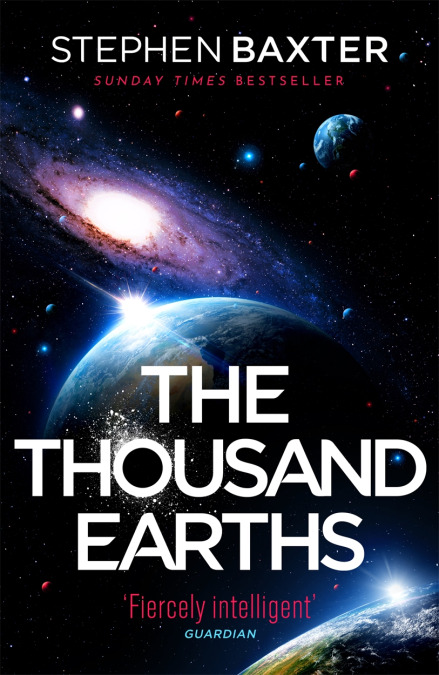
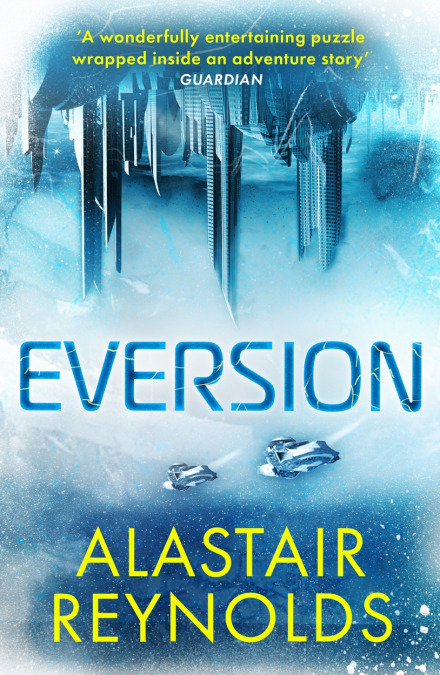
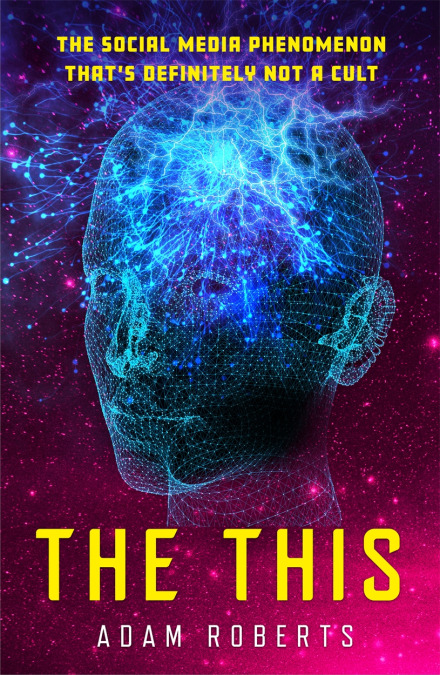


BEST FANTASY NOVEL
Aspects, John M. Ford (published under our Gateway imprint, with introduction by @neil-gaiman)
The Cartographers, Peng Shepherd (published under our sister imprint Orion)
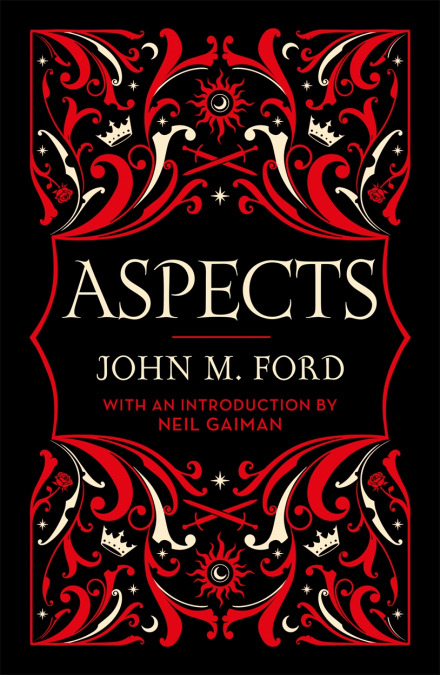

BEST EDITOR
Gillian Redfearn, Gollancz
Maybe we're biased, but Gillian's the best. She's been at Gollancz nearly 20 years, and is the editor for Brandon Sanderson, Joe Abercrombie, Alastair Reynolds, Aliette de Bodard, Joanne Harris, Garth Nix, Elizabeth Bear, Patrick Rothfuss, Miles Cameron, Chris Wooding, Sarah Pinborough, Charlaine Harris... the list goes on! The only UK-based editor to be shortlisted for a Hugo award, she's also genuinely one of the nicest people you will ever meet.
BEST PUBLISHER
Gollancz
We are the oldest dedicated SFF imprint in the world. Founded by Victor Gollancz in 1927, we were the original home of George Orwell, Daphne du Maurier, Kingsley Amis and many others. Victor Gollancz was a proud humanitarian, and that informed his publishing ethos. A newspaper review in 1933 read, "On a yellow Gollancz wrapped you will alway find a black V on G. You may interpret it as either Victor Gollancz or as Very Good, and in either case you'll be right."
In the 1960s, Gollancz became a dedicated SFF and horror imprint, and has continued to publish some of the best works in the genre. Through our SF Gateway list, we have created an archive of books which has rescued and reissued books which had never before been digitised, as well as collecting some of the greatest SFF ever written.
In 2019, we partnered with Ben Aaronovitch to launch the Gollancz and Rivers of London BAME award, looking for British writers from underrepresented backgrounds. The success of this led to it expanding into its current form as The Future Worlds Prize, which now involves several UK SFF publishers.
In 2021, we won the British Book Award for Best Imprint - the first time it had ever been awarded to an SFF imprint.
We have big plans to keep growing in the run up to our centenary, and we can't wait to tell you about them!
#Gollancz Blogging#Locus Awards#Locus Magazine#Voting#SFF#Science Fiction#Fantasy#Horror#Books#Publishing#industry awards
13 notes
·
View notes
Text
Title: Spirits Abroad
Author: Zen Cho
Publication Year of Edition: 2021
Publisher: Small Beer Press
Genre: fiction, fantasy, queer lit, short stories
This was a unique collection of short stories that drew primarily from Malaysian (I want to say that it’s predominantly Malaysian Chinese) culture and folklore. It took some getting used to the heavy use of what I discovered was Manglish (Malaysian English)—which has its own linguistic rules—but it added a lot of charm and nuance to the stories that featured this creole language. In addition, Cho’s storytelling is vibrant, clever, and playful, which I think really comes through in her characters (the overwhelming majority of them being girls and women) and their interactions with one another.
The particular edition I read included short stories that were not published in the original edition. Yet, I felt the flow from one story to the next worked really well, which I think reflects Cho’s interests in the kinds of stories she wants to tell. Like most other collections, I didn’t particularly find myself invested in every short story, but I will say the ones that stood out were especially remarkable. I was particularly taken to “The House of Aunts” and “If at First You Don’t Succeed, Try, Try Again.” The latter short story—which justifiably won the Hugo Award for Best Novelette back in 2019—was a bit of an anomaly in this collection, specifically drawing from Korean mythology as opposed to Malaysian.
Content Warning: body horror, gore, stalking, emotional abuse, death, some biphobia
5 notes
·
View notes
Text
When to Stop Worldbuilding with Chris Fox, Jason Sizemore, John Joseph Adams, C.L. Clark
Welcome to a special Bonus Season! Enjoy these sessions from this year's Worldbuilding Con!
It’s easy to get carried away by the desire to fully flesh out your fictional world. Our panel of industry experts will explain how much worldbuilding is enough - and how to deliver it for maximum impact, while avoiding the dreaded “exposition infodump prologue.”
Why do we need to stop worldbuilding?
What worldbuilding elements should be going on the page?
What tricks create the illusion of deep worldbuilding without too much detail?
Tips for guiding readers into a complex setting gradually
To prologue or not to prologue?
🎙️Speakers:
John Joseph Adams is the series editor of Best American Science Fiction and Fantasy and is the editor of more than thirty anthologies, such as Wastelands, Lost Worlds & Mythological Kingdoms, and Epic: Legends of Fantasy. He is also editor (and publisher) of the Hugo Award-winning magazine Lightspeed and is publisher of its sister-magazines Nightmare and Fantasy. Called “the reigning king of the anthology world” by Barnes & Noble, John is a two-time winner of the Hugo Award and an eight-time World Fantasy Award finalist.
C.L. Clark is a BFA award-winning editor and the Nebula-nominated author of The Unbroken, the first of the Magic of the Lost trilogy, several short stories, and a few essays. When she’s not imagining the fall of empires, she’s trying not to throw her kettlebells through the walls.
Chris Fox is the Amazon bestselling author of The Magitech Chronicles, Shattered Gods, and The Dark Lord Bert. He loves RPGs, and is very proud to have one of his own in print, all to impress a girl, now his wife and mother of his son.
Jason Sizemore is the owner and editor-in-chief of Apex Magazine and Apex Books. He's been nominated for multiple Hugo Awards for his editing work. His most recent anthologies include DO NOT GO QUIETLY: STORIES OF RESISTANCE and APEX MAGAZINE: 2021.
grab the latest podcast episode 👉
#worldbuilding#world building#worldbuilder#worldbuilders#world anvil#writing podcast#creative podcast#creator podcast#dnd#D&D
2 notes
·
View notes
Text
What To Do During the Strike, Day 2 (late entry)
*
Subtitle: A loose collection of recommendations to keep you busy, should we suffer from similar tastes and interests.
I've talked about this one before. The Monk and Robot series is … gentle. It is kind to the reader. There is conflict at the most mundane level (so and so wants this sort of tea, the brush of the forest is hard to get through), but there is nobody to hate here.
The premise is that the robots became self-aware. Things happened. The robots left. And then they came back with just one driving question: "What do you need?"
This won the 2021 Nebula Award, as well as the 2022 Hugo and Locus Awards. It's also novella length. This feels fantasy to me, although there are robots, so, maybe soft sci-fi? Excellent writing, again.
It strikes me that I am leaning heavily into machines, humans, what it means to be human, and what it means to be a good person. Like it says on the tin, "Should we suffer from similar tastes and interests." :) It's a peculiar madness. Let's do it.
---
Tonight I'll post on a soft sci-fi television series, available on streaming.
---
Edited to add: Running tally at
3 notes
·
View notes
Text
Hugo Awarded Books:
1. T.H.White - The Sword in The Stone(1939)(3/02/23)
2. A.E. van Vogt - Slan(1941)
3. Robert A. Heinlein - Beyond This Horizon(1943)(21/06/23)
4. Fritz Leiber - Conjure Wife(1944)(30/06/23)
5. Leigh Brackett - Shadow Over Mars(1945)(19/05/23)
6. Isaac Asimov - The Mule(1946)
7. Robert A. Heinlein - Farmer in The Sky(1951)(30/01/23)
8. Alfred Bester - The Demolished Man(1953)
9. Ray Bradbury - Fahrenheit 451(1954)
10. Mark Clifton - They'd Rather Be Right(1955)
11. Robert A. Heinlein - Double Star(1956)
12. Fritz Leiber - The Big Time(1958)
13. James Blish - A Case of Conscience(1959)
14. Robert A. Heinlein - Starship Troopers(1960)
15. Walter M. Miller, Jr. - A Canticle for Leibowitz(1961)
16. Robert A. Heinlein - Stranger in a Strange Land(1962)
17. Philip K. Dick - The Man in The High Castle(1963)
18. Clifford D. Simak - Here Gather the Stars(Way Station)(1964)
19. Fritz Leiber - The Wanderer(1965)
20. Frank Herbert - Dune(1966)
21. Robert A. Heinlein - The Moon is a Harsh Mistress(1967)
22. Roger Zelazny - Lord of Light(1968)
23. John Brunner - Stand on Zanzibar(1969)
24. Ursula K. Le Guin - The Left Hand of Darkness(1970)
25. Larry Niven - Ringworld(1971)
26. Philip José Farmer - To Your Scattered Bodies Go(1972)
27. Isaac Asimov - The Gods Themselves(1973)
28. Arthur C. Clarke - Rendezvous with Rama(1974)
29. Ursula K. Le Guin - The Dispossessed(1975)
30. Joe Haldeman - The Forever War(1976)
31. Kate Wilhelm - Where Late the Sweet Birds Sang(1977)
32. Frederik Pohl - Gateway(1978)
33. Vonda N. McIntyre - Dreamsnake(1979)
34. Arthur C. Clarke - The Fountains of Paradise(1980)
35. Joan D. Vinge - The Snow Queen(1981)
36. C. J. Cherryh - Downbelow Station(1982)
37. Isaac Asimov - Foundation's Edge(1983)
38. David Brin - Startide Rising(1984)
39. William Gibson - Neuromancer(1985)
40. Orson Scott Card - Ender's Game(1986)
41. Orson Scott Card - Speaker for the Dead(1987)
42. David Brin - The Uplift War(1988)
43. C. J. Cherryh - Cyteen(1989)
44. Dan Simmons - Hyperion(1990)
45. Lois McMaster Bujold - The Vor Game(1991)
46. Lois McMaster Bujold - Barrayar(1992)
47. Vernor Vinge - A Fire Upon the Deep(1993)
48. Connie Willis - Doomsday Book(1993)
49. Kim Stanley Robinson - Green Mars(1994)
50. Lois McMaster Bujold - Mirror Dance(1995)
51. Neal Stephenson - The Diamond Age(1996)
52. Kim Stanley Robinson - Blue Mars(1997)
53. Joe Haldeman - Forever Peace(1998)
54. Connie Willis - To Say Nothing to the Dog(1999)
55. Vernor Vinge - A Deepness in The Sky(2000)
56. J.K.Rowling - Harry Potter and the Goblet of Fire(2001)
57. Neil Gaiman - American Gods(2002)
58. Robert J. Sawyer - Hominids(2003)
59. Lois McMaster Bujold - Paladin of Souls(2004)
60. Susanna Clarke - Jonathan Strange and Mr.Norrell(2005)
61. Robert Charles Wilson - Spin(2006)
62. Vernor Vinge - Rainbows End(2007)
63. Michael Chabon - The Yiddish Policemen's Union(2008)
64. Neil Gaiman - The Graveyard Book(2009)
65. Paolo Bacigalupi - The Windup Girl(2010)
66. China Miéville - The City & the City(2010)
67. Connie Willis - Blackout/All Clear(2011)
68. Jo Walton - Among Others(2012)
69. John Skalzi - Redshirts(2013)
70. Ann Leckie - Ancillary Justice(2014)
71. Cixin Liu - The Three-Body Problem(2015)
72. N.K.Jemisin - The Fifth Season(2016)
73. N.K.Jemisin - The Obelisk Gate(2017)
74. N.K.Jemisin - The Stone Sky(2018)
75. Mary Robinette Kowal - The Calculating Stars(2019)
76. Arkady Martine - A Memory Called Empire(2020)
77. Martha Wells - Network Effect(2021)
78. Arkady Martine - A Desolation Called Peace(2022)
6 notes
·
View notes
Note
12, 15, 20!
Any books that disappointed you?
A few! Mostly books I was expecting to be a fun romp and then were just boring. Mostly everything I tried to read by Taylor Jenkins Reid, I think all her books will make cool screen adaptations because she's great at setting up an aesthetic vibe and then... that's it. Also Alexis Hall went from "hit and miss" to "not for me" over this year, and I read only one Riley Sager (The House Across The Lake) and found it dull enough to lose all curiosity in his books from now on.
Did you read any books that were nominated for or won awards this year (Booker, Women’s Prize, National Book Award, Pulitzer, Hugo, etc.)? What did you think of them?
Oooh, cool question! I didn't read any award-winning books on purpose this year, but some past winners definitely snuck in accidentally. Happily, these were all books that made me feel richer for having read them and tbh I enjoyed all of them quite a bit.
Jonathan Strange & Mr Norrrel (Hugo 2005)
The Fifth Season (Hugo 2016)
Say Nothing (National Book Critics Circle Award 2019)
Empire of Pain (Baillie Gifford Prize 2021)
Probably others may have snuck in but tbh I'm very bad about keeping track of who won what.
What was your most anticipated release? Did it meet your expectations?
Weirdly enough, I spent most of 2022 thinking Nona The Ninth was going to be a short story / novella until like 5 days before release, when I started getting hyped like crazy. Loved it.
I was also anticipating The Golden Enclaves by Naomi Novik (tbh a delight! And I say this as someone who doesn't usually vibe with YA) and Lapvona (couldn't get into the book in written format, will try again with audiobook at some point).
[end of year book asks]
2 notes
·
View notes
Text
Jess' Queer Media Example: Ga(y)mes
Known as the ninth art, video games play an equally important role in reflecting society and politics as other works of art we know. In the article Not Gay as in Happy: Queer Resistance and Video Games, authors argue that queer video games and games with queerness content do not exist to please players or a certain group of people for pleasure, but as a radical rebellion.
In the game industry, game enterprises and independent games have many different differences, the former has a wider audience, has more resources and a platform for sales, and its game production is subject to more constraints and influence; while the latter is often in the limited resources to create works, the lack of corporate constraints allow these games to express what the production team wants to express more freely. The example I bring today is the game hades by Super Giant Game. hades are a roguelike action game, based on Greek mythology and the gods of Athens as a source of inspiration and story. The player takes the role of Zagreus, the son of Hades, who fights various opponents and bosses and his own father in order to escape from hell. It won the 79th Hugo Award for Best Video Game.
In Hades, there are not only direct expressions of queer content, but also many occurrences of queer significant. The former is easy to spot for almost all player groups, while the latter becomes a more obvious representation of identities in queer groups.
Queer Content- Zagreus + Thanatos + Megaera
The romantic relationship of male characters with male characters in the game and their multilateral romantic relationship with female characters is part of the queer culture. This is not only an expression of rebellion against tradition in sexual orientation, but also a rebellion against traditional two-person relationships in romantic relationships.
youtube
(1:53-2:22)
youtube
Queer signifies: Dionysus

The NPC character in this game, although it does not indicate his direct sexual orientation, but many players, especially those who belong to the queer community can identify his body queer elements, such as wearing garter stockings, being flirty, androgynous (not explicitly stated, but can be speculated from the dialogue).
The cultural landscape of video games has become a more "diverse" place not because of the promise of the games themselves, but as a result of challenging norms that undermine dominant power structures (Ruberg & Phillips, 2018). Hades is very natural and ordinary in its presentation of queer content and elements, it is not a game that seems very radical and boasts its own queer attributes, but its queer content and many hints are diverse and rich. And it is considered a niche queerness while becoming the best game of the year in 2021, which represents the success of its rebellion.
Reference: Ruberg, B., & Phillips, A. (2018). Not Gay as in Happy: Queer Resistance and Video Games (Introduction). Game Studies, 18(3). https://doi.org/ISSN:1604-7982
1 note
·
View note